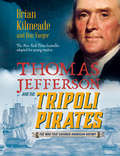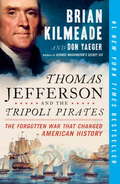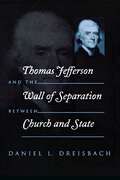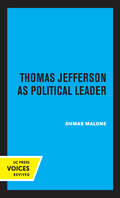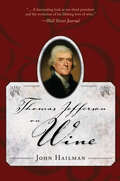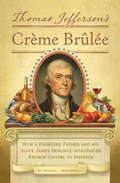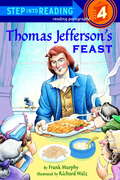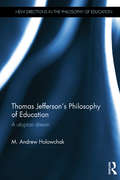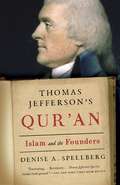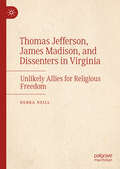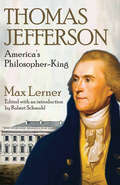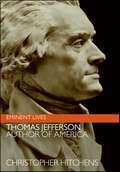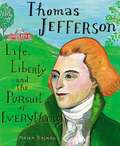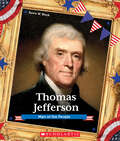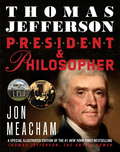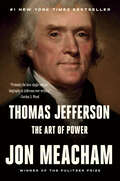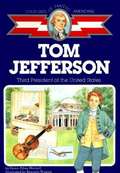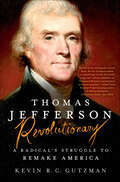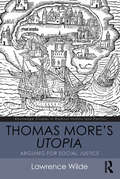- Table View
- List View
Thomas Jefferson and the Tripoli Pirates (Young Readers Adaptation)
by Brian Kilmeade Don YaegerA page-turning middle-grade adaptation of the New York Times bestseller about how a newly independent nation was challenged by foreign powers and what happened when America's third president decided to stand up to intimidation.When Thomas Jefferson became president in 1801, America was deeply in debt and needed its economy to grow quickly, but its merchant ships were under attack. Pirates from North Africa routinely captured American sailors and held them as captives demanding ransom and tribute far beyond what the new country could afford.Jefferson found it impossible to negotiate a truce, and decided to move beyond diplomacy. He sent the U.S. Navy and Marines to blockade Tripoli--launching the Barbary Wars and beginning America's journey toward future superpower status.This vivid and accessible young readers adaptation of the New York Times bestseller features an exclusive new introduction, extensive back matter, and eye-catching art throughout. Chronicling a crucial moment in American history, this historical thriller will excite and inspire the next generation of patriots.
Thomas Jefferson and the Tripoli Pirates: The Forgotten War That Changed American History
by Brian Kilmeade Don Yaeger"Another blockbuster! Thomas Jefferson and the Tripoli Pirates reads like an edge-of-your-seat, page-turning thriller. You will love this book and also wonder why so few people know this story. No one captures the danger, intrigue, and drama of the American Revolution and its aftermath like Brian Kilmeade and Don Yaeger." --Brad ThorThis is the little-known story of how a newly independent nation was challenged by four Muslim powers and what happened when America's third president decided to stand up to intimidation. When Thomas Jefferson became president in 1801, America faced a crisis. The new nation was deeply in debt and needed its economy to grow quickly, but its merchant ships were under attack. Pirates from North Africa's Barbary coast routinely captured American sailors and held them as slaves, demanding ransom and tribute payments far beyond what the new country could afford. Over the previous fifteen years, as a diplomat and then as secretary of state, Jefferson had tried to work with the Barbary states (Tripoli, Tunis, Algiers, and Morocco). Unfortunately, he found it impossible to negotiate with people who believed their religion justified the plunder and enslavement of non-Muslims. These rogue states would show no mercy--at least not while easy money could be made by extorting the Western powers. So President Jefferson decided to move beyond diplomacy. He sent the U.S. Navy's new warships and a detachment of Marines to blockade Tripoli--launching the Barbary Wars and beginning America's journey toward future superpower status. As they did in their previous bestseller, George Washington's Secret Six, Kilmeade and Yaeger have transformed a nearly forgotten slice of history into a dramatic story that will keep you turning the pages to find out what happens next. Among the many suspenseful episodes: ·Lieutenant Andrew Sterett's ferocious cannon battle on the high seas against the treacherous pirate ship Tripoli. ·Lieutenant Stephen Decatur's daring night raid of an enemy harbor, with the aim of destroying an American ship that had fallen into the pirates' hands.·General William Eaton's unprecedented five-hundred-mile land march from Egypt to the port of Derne, where the Marines launched a surprise attack and an American flag was raised in victory on foreign soil for the first time. Few today remember these men and other heroes who inspired the Marine Corps hymn: "From the Halls of Montezuma to the Shores of Tripoli, we fight our country's battles in the air, on land and sea." Thomas Jefferson and the Tripoli Pirates recaptures this forgotten war that changed American history with a real-life drama of intrigue, bravery, and battle on the high seas.
Thomas Jefferson and the Tripoli Pirates: The Forgotten War That Changed American History
by Brian Kilmeade Don Yaeger"Another blockbuster! Thomas Jefferson and the Tripoli Pirates reads like an edge-of-your-seat, page-turning thriller. You will love this book and also wonder why so few people know this story. No one captures the danger, intrigue, and drama of the American Revolution and its aftermath like Brian Kilmeade and Don Yaeger." --Brad ThorThis is the little-known story of how a newly independent nation was challenged by four Muslim powers and what happened when America's third president decided to stand up to intimidation. When Thomas Jefferson became president in 1801, America faced a crisis. The new nation was deeply in debt and needed its economy to grow quickly, but its merchant ships were under attack. Pirates from North Africa's Barbary coast routinely captured American sailors and held them as slaves, demanding ransom and tribute payments far beyond what the new country could afford. Over the previous fifteen years, as a diplomat and then as secretary of state, Jefferson had tried to work with the Barbary states (Tripoli, Tunis, Algiers, and Morocco). Unfortunately, he found it impossible to negotiate with people who believed their religion justified the plunder and enslavement of non-Muslims. These rogue states would show no mercy--at least not while easy money could be made by extorting the Western powers. So President Jefferson decided to move beyond diplomacy. He sent the U.S. Navy's new warships and a detachment of Marines to blockade Tripoli--launching the Barbary Wars and beginning America's journey toward future superpower status. As they did in their previous bestseller, George Washington's Secret Six, Kilmeade and Yaeger have transformed a nearly forgotten slice of history into a dramatic story that will keep you turning the pages to find out what happens next. Among the many suspenseful episodes: ·Lieutenant Andrew Sterett's ferocious cannon battle on the high seas against the treacherous pirate ship Tripoli. ·Lieutenant Stephen Decatur's daring night raid of an enemy harbor, with the aim of destroying an American ship that had fallen into the pirates' hands.·General William Eaton's unprecedented five-hundred-mile land march from Egypt to the port of Derne, where the Marines launched a surprise attack and an American flag was raised in victory on foreign soil for the first time. Few today remember these men and other heroes who inspired the Marine Corps hymn: "From the Halls of Montezuma to the Shores of Tripoli, we fight our country's battles in the air, on land and sea." Thomas Jefferson and the Tripoli Pirates recaptures this forgotten war that changed American history with a real-life drama of intrigue, bravery, and battle on the high seas.
Thomas Jefferson and the Wall of Separation Between Church and State (Critical America)
by Daniel DreisbachThe origins, controversies, and competing interpretations of the famous phrase: &“A welcome and much-needed addition to [First Amendment] scholarship.&” —Journal of Interdisciplinary Studies No phrase in American letters has had a more profound influence on church-state law, policy, and discourse than Thomas Jefferson&’s &“wall of separation between church and state,&” and few metaphors have provoked more passionate debate. Introduced in an 1802 letter to the Danbury, Connecticut Baptist Association, Jefferson&’s &“wall&” is accepted by many Americans as a concise description of the U.S. Constitution&’s church-state arrangement and conceived as a virtual rule of constitutional law. Despite the enormous influence of the &“wall&” metaphor, almost no scholarship has investigated the text of the Danbury letter, the context in which it was written, or Jefferson&’s understanding of his famous phrase. This book offers an in-depth examination of the origins, controversial uses, and competing interpretations of this powerful metaphor in law and public policy.
Thomas Jefferson as Political Leader (Jefferson Memorial Lectures)
by Dumas MaloneThis title is part of UC Press's Voices Revived program, which commemorates University of California Press’s mission to seek out and cultivate the brightest minds and give them voice, reach, and impact. Drawing on a backlist dating to 1893, Voices Revived makes high-quality, peer-reviewed scholarship accessible once again using print-on-demand technology. This title was originally published in 1963.
Thomas Jefferson for Kids: His Life and Times with 21 Activities
by Brandon Marie MillerDrawing heavily from the original letters and papers of Thomas Jefferson and his contemporaries, this resource chronicles the world of the Founding Father who wrote the Declaration of Independence. From his early critiques of the colonial policies of Great Britain and King George III to his governmental roles as the first secretary of state, the minister to France, and the third president of the United States, Jefferson's groundbreaking achievements are described in historical context. The contradictions in Jefferson's character--most notably the fact that he owned 600 slaves in his lifetime despite penning the immortal phrase "all men are created equal"--are also explored, giving kids a full picture of this skilled politician. Creative activities that invite children to experience Jefferson's colonial America include designing a Palladian window, building a simple microscope, painting a "buffalo robe," and dancing a reel.
Thomas Jefferson on Wine
by John HailmanIn Thomas Jefferson on Wine, John Hailman celebrates a founding father's lifelong interest in wine and provides unprecedented insight into Jefferson's character from this unique perspective. In both his personal and public lives, Jefferson wielded his considerable expertise to influence the drinking habits of his friends, other founding fathers, and the American public away from hard liquor toward the healthier pleasures of wine. An international wine judge and nationally syndicated wine columnist, Hailman discusses how Jefferson's tastes developed, which wines and foods he preferred at different stages of his life, and how Jefferson became the greatest wine expert of the early American republic. Hailman explores the third president's fascination with scores of wines from his student days at Williamsburg to his lengthy retirement years at Monticello, using mainly Jefferson's own words from hundreds of immensely readable and surprisingly modern letters on the subject. Hailman examines Jefferson's five critical years in Paris, where he learned about fine wines at Europe's salons and dinner tables as American Ambassador. The book uses excerpts from Jefferson's colorful travel journals of his visits to France, Italy, and Germany, as well as his letters to friends and wine merchants, some of whose descendants still produce the wines Jefferson enjoyed. Vivid contemporaneous accounts of dinners at the White House allow readers to experience vicariously Jefferson's "Champagne diplomacy." The book concludes with an overview of the current restoration of the vineyards at Monticello and the new Monticello Wine Trail and its numerous world-class Virginia wineries. In Thomas Jefferson on Wine, Hailman presents an absorbing and unique view of this towering historical figure.
Thomas Jefferson's Creme Brulee: How a Founding Father and His Slave James Hemings Introduced French Cuisine to America
by Thomas J. CraughwellThis culinary biography recounts the 1784 deal that Thomas Jefferson struck with his slaves, James Hemings. The founding father was traveling to Paris and wanted to bring James along "for a particular purpose"-- to master the art of French cooking. In exchange for James's cooperation, Jefferson would grant his freedom. Thus began one of the strangest partnerships in United States history. As Hemings apprenticed under master French chefs, Jefferson studied the cultivation of French crops (especially grapes for winemaking) so the might be replicated in American agriculture. The two men returned home with such marvels as pasta, French fries, Champagne, macaroni and cheese, crème brûlée, and a host of other treats. This narrative history tells the story of their remarkable adventure--and even includes a few of their favorite recipes!
Thomas Jefferson's Ethics and the Politics of Human Progress
by Ari HeloCould Jefferson claim any consistency in his advocacy of democracy and the rights of man while remaining one of the largest slaveholders in Virginia? This extensive study of Jefferson's intellectual outlook suggests that, once we fully acknowledge the premises of his ethical thought and his now outdated scientific views, he could. Jefferson famously thought the human mind to be 'susceptible of much improvement … most of all, in matters of government and religion'. Ari Helo's thorough analysis of Jefferson's understanding of Christian morality, atheism, contemporary theories of moral sentiments, ancient virtue ethics, natural rights, and the principles of justice and benevolence suggests that Jefferson refused to be a philosopher, and did so for moral reasons. This book finds Jefferson profoundly political in his understanding of individual moral responsibility and human progress.
Thomas Jefferson's Feast (Step into Reading)
by Richard Walz Frank MurphyDid you know that every time you munch on a french fry or snack on ice cream, you have Thomas Jefferson to thank? It's true! This founding father was one of America's first foodies. After a visit to France, he introduced all sorts of yummy treats to America--including one that upset more than just tummies and created a culinary controversy! Get the scoop in this deliciously funny, true story--guaranteed to tempt even the most reluctant readers!
Thomas Jefferson's Philosophy of Education: A utopian dream (New Directions in the Philosophy of Education)
by M. Andrew HolowchakThomas Jefferson had a profoundly advanced educational vision that went hand in hand with his political philosophy - each of which served the goal of human flourishing. His republicanism marked a break with the conservatism of traditional non-representative governments, characterized by birth and wealth and in neglect of the wants and needs of the people. Instead, Jefferson proposed social reforms which would allow people to express themselves freely, dictate their own course in life, and oversee their elected representatives. His educational vision aimed to instantiate a progressive social climate only dreamed of by utopists such as Thomas More, James Harrington and Louis-Sébastian Mercier. This book offers a critical articulation of the philosophy behind Jefferson’s thoughts on education. Divided into three parts, chapters include an analysis of his views on elementary and higher education, an investigation of education for both the moral-sense and rational faculty, and an examination of education as lifelong learning. Jefferson’s educational rationale was economic, political and philosophical, and his systemic approach to education conveys a systemic, economic approach to living, with strong affinities to Stoicism. Thomas Jefferson’s Philosophy of Education will be key reading for philosophers, historians and postgraduate students of education, the history of education and philosophy.
Thomas Jefferson's Qur'an: Islam and the Founders
by Denise A. SpellbergIn this original and illuminating book, Denise A. Spellberg reveals a little-known but crucial dimension of the story of American religious freedom--a drama in which Islam played a surprising role. In 1765, eleven years before composing the Declaration of Independence, Thomas Jefferson bought a Qur'an. This marked only the beginning of his lifelong interest in Islam, and he would go on to acquire numerous books on Middle Eastern languages, history, and travel, taking extensive notes on Islam as it relates to English common law. Jefferson sought to understand Islam notwithstanding his personal disdain for the faith, a sentiment prevalent among his Protestant contemporaries in England and America. But unlike most of them, by 1776 Jefferson could imagine Muslims as future citizens of his new country. Based on groundbreaking research, Spellberg compellingly recounts how a handful of the Founders, Jefferson foremost among them, drew upon Enlightenment ideas about the toleration of Muslims (then deemed the ultimate outsiders in Western society) to fashion out of what had been a purely speculative debate a practical foundation for governance in America. In this way, Muslims, who were not even known to exist in the colonies, became the imaginary outer limit for an unprecedented, uniquely American religious pluralism that would also encompass the actual despised minorities of Jews and Catholics. The rancorous public dispute concerning the inclusion of Muslims, for which principle Jefferson's political foes would vilify him to the end of his life, thus became decisive in the Founders' ultimate judgment not to establish a Protestant nation, as they might well have done. As popular suspicions about Islam persist and the numbers of American Muslim citizenry grow into the millions, Spellberg's revelatory understanding of this radical notion of the Founders is more urgent than ever. Thomas Jefferson's Qur'an is a timely look at the ideals that existed at our country's creation, and their fundamental implications for our present and future.
Thomas Jefferson, James Madison, and Dissenters in Virginia: Unlikely Allies for Religious Freedom
by Debra NeillThis book follows the campaign to disestablish religion in Virginia from 1776 to 1786, when Thomas Jefferson&’s bill to establish religious freedom was passed. This volume seeks to tell the story of Jefferson and James Madison&’s collaboration with Virginia&’s religious dissenters; in doing so, Neill works to understand why religion was disestablished in Virginia. Neill argues that despite their religious differences these unlikely allies shared a basic understanding of what religious freedom meant and how best to secure it: by severing the ties between church and state.
Thomas Jefferson: 3rd President of the United States
by Rebecca StefoffTraces the life of the Virginia politician, American diplomat, and United States president and examines the domestic and foreign issues dominating his career.
Thomas Jefferson: America's Philosopher-King
by Max LernerOver the course of more than six decades as an author, journalist, and professor, Max Lerner studied and assessed many presidents, yet Thomas Jefferson received his most sustained attention. To Lerner, Jefferson came closest in the American context to Plato's "philosopher-king," the ideal thinker and leader. Because of his keen sense of Jefferson's virtues and his unique place in United States history, Lerner began work on a book about Jefferson in 1957, rewriting it several times throughout his life, always with the intention of introducing general readers to "a thinker and public figure of enduring pertinence."In this volume, Lerner uses the facts of Jefferson's life and work as the springboard to insightful analysis and informed assessment. In considering Jefferson, Lerner combines biographical information, historical background, and analytical commentary. The result is a biographical-interpretive volume, a primer about Jefferson that not only describes his accomplishments, but discusses his problems and failures.As political figures have declined in esteem in recent decades, the media has probed deeper into previously private lives. Historians, biographers, and others have revealed personal details about deceased prominent figures. Two centuries after he helped create America, Jefferson remains a figure of enduring fascination within academic circles and beyond. Max Lerner helps explain and clarify not only this unending fascination, but the timeless relevance of the nation's devoutly democratic yet singularly authentic "philosopher-king."
Thomas Jefferson: An Intimate History
by Fawn M. BrodieA bibliography of one of our most interesting Presidents, Thomas Jefferson.
Thomas Jefferson: Author of America (Eminent Lives)
by Christopher Hitchens"A balanced, readable portrait. A refreshing perspective.” —New York Times Book ReviewWith intelligence, insight, eloquence, and wit, bestselling author Christopher Hitchens gives us an artful portrait of a complex, formative figure in American history and his turbulent era.In this unique biography of Thomas Jefferson, leading journalist and social critic Christopher Hitchens offers a startlingly new and provocative interpretation of our Founding Father—a man conflicted by power who wrote the Declaration of Independence and acted as ambassador to France yet yearned for a quieter career in the Virginia legislature. A masterly writer, Jefferson was an awkward public speaker. A professed proponent of emancipation, he elided the issue of slavery from the Declaration of Independence and continued to own human property. A reluctant candidate, he left an indelible presidential legacy.
Thomas Jefferson: Life, Liberty and the Pursuit of Everything
by Maira KalmanRenowned artist Maira Kalman sheds light on the fascinating life and interests of the Renaissance man who was our third president.Thomas Jefferson is perhaps best known for writing the Declaration of Independence—but there’s so much more to discover. This energetic man was interested in everything. He played violin, spoke seven languages and was a scientist, naturalist, botanist, mathematician and architect. He designed his magnificent home, Monticello, which is full of objects he collected from around the world. Our first foodie, he grew over fifteen kinds of peas and advocated a mostly vegetarian diet. And oh yes, as our third president, he doubled the size of the United States and sent Lewis and Clark to explore it. He also started the Library of Congress and said, “I cannot live without books.” But monumental figures can have monumental flaws, and Jefferson was no exception. Although he called slavery an “abomination,” he owned about 150 slaves.As she did in Looking at Lincoln, Maira Kalman shares a president’s remarkable, complicated life with young readers, making history come alive with her captivating text and stunning illustrations.
Thomas Jefferson: Man of the People (Presidential Biographies)
by Sonia BlackMeet Thomas Jefferson, our third president-and one of the most famous of America's Founding Fathers. Jefferson was the author of the Declaration of Independence. During his time in office, he tried to maintain the ideals he had outlined in that document. He supported scientific exploration and worked to give Americans religious freedom and access to education. He will always be remembered.This series of engaging, in-depth books introduces readers to the men who have led our country since its very first days. Lively text and colorful illustrations are supplemented by fun facts, a timeline, and even a sampling of the subject's most famous quotes.Presidential Biographies will be the first books kids reach for when writing a report-or if they're simply looking for a fascinating read!
Thomas Jefferson: President and Philosopher
by Jon MeachamIn this special illustrated edition of the #1 New York Times bestselling Thomas Jefferson: The Art of Power by Pulitzer Prize-winning author Jon Meacham, young readers will learn about the life and political philosophy of one of our Founding Fathers. Thomas Jefferson was the third president of the United States. He was one of the authors of the Declaration of Independence. But he was also a lawyer and an ambassador, an inventor and a scientist. He had a wide range of interests and hobbies, but his consuming interest was the survival and success of the United States. This book contains a note from Meacham and over 100 archival illustrations, as well as sections throughout the text about subjects such as the Boston Tea Party, the Library of Congress, and Napoléon Bonaparte. Additional materials include a time line; a family tree; a Who's Who in Jefferson's world; sections on Jefferson's original writings and correspondence, "inventions," interests, places in Jefferson's world, finding Jefferson in the United States today, additional reading, organizations, and websites; notes; a bibliography; and an index. This adaptation, ideal for those interested in American presidents, biographies, and the founding of the American republic, is an excellent example of informational writing and reflects Meacham's extensive research using primary source material.
Thomas Jefferson: The Art of Power
by Jon MeachamNAMED ONE OF THE BEST BOOKS OF THE YEAR BY The New York Times Book Review * The Washington Post * Entertainment Weekly * The Seattle Times * St. Louis Post-Dispatch * Bloomberg BusinessweekIn this magnificent biography, the Pulitzer Prize-winning author of American Lion and Franklin and Winston brings vividly to life an extraordinary man and his remarkable times. Thomas Jefferson: The Art of Power gives us Jefferson the politician and president, a great and complex human being forever engaged in the wars of his era. Philosophers think; politicians maneuver. Jefferson's genius was that he was both and could do both, often simultaneously. Such is the art of power. Thomas Jefferson hated confrontation, and yet his understanding of power and of human nature enabled him to move men and to marshal ideas, to learn from his mistakes, and to prevail. Passionate about many things--women, his family, books, science, architecture, gardens, friends, Monticello, and Paris--Jefferson loved America most, and he strove over and over again, despite fierce opposition, to realize his vision: the creation, survival, and success of popular government in America. Jon Meacham lets us see Jefferson's world as Jefferson himself saw it, and to appreciate how Jefferson found the means to endure and win in the face of rife partisan division, economic uncertainty, and external threat. Drawing on archives in the United States, England, and France, as well as unpublished Jefferson presidential papers, Meacham presents Jefferson as the most successful political leader of the early republic, and perhaps in all of American history. The father of the ideal of individual liberty, of the Louisiana Purchase, of the Lewis and Clark expedition, and of the settling of the West, Jefferson recognized that the genius of humanity--and the genius of the new nation--lay in the possibility of progress, of discovering the undiscovered and seeking the unknown. From the writing of the Declaration of Independence to elegant dinners in Paris and in the President's House; from political maneuverings in the boardinghouses and legislative halls of Philadelphia and New York to the infant capital on the Potomac; from his complicated life at Monticello, his breathtaking house and plantation in Virginia, to the creation of the University of Virginia, Jefferson was central to the age. Here too is the personal Jefferson, a man of appetite, sensuality, and passion. The Jefferson story resonates today not least because he led his nation through ferocious partisanship and cultural warfare amid economic change and external threats, and also because he embodies an eternal drama, the struggle of the leadership of a nation to achieve greatness in a difficult and confounding world.Praise for Thomas Jefferson: The Art of Power "This is probably the best single-volume biography of Jefferson ever written."--Gordon S. Wood "A big, grand, absorbing exploration of not just Jefferson and his role in history but also Jefferson the man, humanized as never before."--Entertainment Weekly"[Meacham] captures who Jefferson was, not just as a statesman but as a man. . . . By the end of the book . . . the reader is likely to feel as if he is losing a dear friend. . . . [An] absorbing tale."--The Christian Science Monitor"This terrific book allows us to see the political genius of Thomas Jefferson better than we have ever seen it before. In these endlessly fascinating pages, Jefferson emerges with such vitality that it seems as if he might still be alive today."--Doris Kearns GoodwinFrom the Hardcover edition.
Thomas Jefferson: Third President of the United States
by Helen Albee MonsellUsing simple language that beginning readers can understand, this lively, inspiring, and believable biography looks at the childhood of America's third president, Thomas Jefferson.
Thomas Jefferson—Revolutionary: A Radical's Struggle to Remake America
by Kevin R. Gutzman"In this lively and clearly written book, Kevin Gutzman makes a compelling case for the broad range and radical ambitions of Thomas Jefferson's commitment to human equality." - Alan Taylor, Pulitzer Prize winning author of American Revolutions: A Continental History, 1750-1804Though remembered chiefly as author of the Declaration of Independence and the president under whom the Louisiana Purchase was effected, Thomas Jefferson was a true revolutionary in the way he thought about the size and reach of government, which Americans who were full citizens and the role of education in the new country. In his new book, Kevin Gutzman gives readers a new view of Jefferson—a revolutionary who effected radical change in a growing country.Jefferson’s philosophy about the size and power of the federal system almost completely undergirded the Jeffersonian Republican Party. His forceful advocacy of religious freedom was not far behind, as were attempts to incorporate Native Americans into American society. His establishment of the University of Virginia might be one of the most important markers of the man’s abilities and character.He was not without flaws. While he argued for the assimilation of Native Americans into society, he did not assume the same for Africans being held in slavery while—at the same time—insisting that slavery should cease to exist. Many still accuse Jefferson of hypocrisy on the ground that he both held that “all men are created equal” and held men as slaves. Jefferson’s true character, though, is more complex than that as Kevin Gutzman shows in his new book about Jefferson, a revolutionary whose accomplishments went far beyond the drafting of the Declaration of Independence.
Thomas K. Beecher: Minister to a Changing America
by Myra C. GlennOne of a series entitled Contributions to the Study of Religion
Thomas More's Utopia: Arguing for Social Justice (Routledge Studies in Radical History and Politics)
by Lawrence WildeThe 500th anniversary of the first publication of Thomas More’s Utopia invites a reappraisal of its significance, not just as an ironic and playful fiction, but as a serious contribution to social and political thought. More delivers a searing critique of the injustices of his time and imagines a radical alternative based on common ownership and representative government. In this new interpretation, Wilde surveys the context from which Utopia emerged and analyses its key themes – politics, economics, social relations, crime and punishment, war and religion. Although the society of the Utopians is created as a remedy to the ailments of the old world, there are restrictions on individual freedom which reflect More’s suspicion of human nature’s innate fragility. Wilde argues that this should not detract from the power of the book in challenging the root causes of inequality and oppression. The true legacy of Utopia lies in its plea for social justice in the face of a world driven by greed and the lust for power. A compelling case is made for the continued relevance of this masterpiece, a legacy that should not be diminished by attempts to discredit More’s character, which are dealt with here in the epilogue. Offering a new perspective on this important historical text, this book is essential reading for students and scholars working in radical politics, the history of social thought and literature, as well as anyone interested in learning more about this fascinating work.
